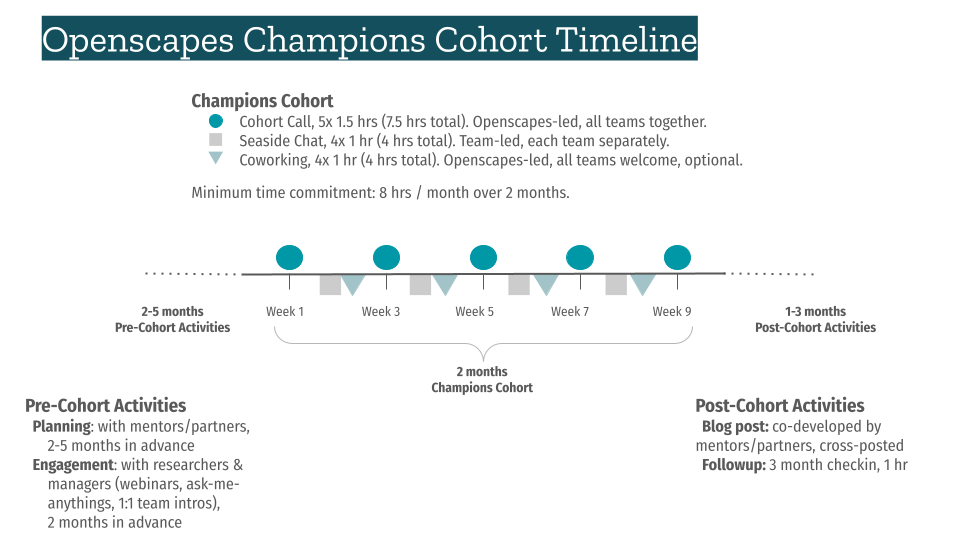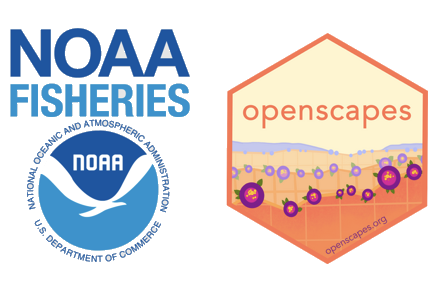Openscapes Champions Cohorts
The NOAA Fisheries Openscapes Mentor Community led 3 Champions Cohorts in Fall 2025! Read on to learn what this is and see the NOAA Fisheries Science Blog, Open Science Momentum at NOAA Fisheries and past cohort pages to learn stories of what past participants have accomplished.
Fall 2025 theme: cloud migration and data preservation.
Signups for Fall 2025 Cohorts are now closed. We will lead 3 more Champions Cohorts in Fall 2026.
What is the Champions Program?
This is a workflow transformation & leadership opportunity.
40 staff from across NOAA Fisheries come together bi-weekly to work on goals related to data science workflows. Do you want an opportunity to make progress on a project you are already working on? Do you or your team have a ‘big goal’ that involves changing how you work and you want to make progress on making your data and science workflows more efficient and reproducible (however you define that)? Do you want to migrate to new data and science workflows, like cloud-based workflows, but don’t know how to get started? Do you want to connect with others across NOAA Fisheries who are interested in Open Science, Open Data and Open Source? The Fall Openscapes Champions Cohorts are for you (and your team)! Make progress on those goals that seem so intangible and hard to get traction on by working in facilitated sessions with your peers and the Openscapes team. Scroll the blogs on what NOAA Fisheries teams and individuals have accomplished in the 13 NOAA Fisheries Champions Cohorts over the past 4 years.
Openscapes Champions is a remote-by-design, cohort-based mentorship program that helps teams re-imagine data analysis and stewardship as a collaborative effort, develop modern skills that are of immediate value to them, and cultivate collaborative and inclusive communities. It is focused on open science and data modernization via biweekly curriculum that Openscapes has improved over 25 Cohorts 2019-2025. The goal is strengthening a teaching and learning culture within teams and organizations. This program is not only for scientists: admin, IT staff, and beyond are welcomed. Individuals and teams do not have to have familiarity or expertise in open science, data science, or coding, to benefit from the Openscapes Champions Program.
Champions Program Details
Fall NOAA Fisheries Openscapes Champions Cohorts run from November 2025-January 2026! We will meet as a cohort five times over two months, on alternating weeks, with additional optional coworking times.
- Date-Times:
- Cohort-A: Nov 18, Dec 2, 16, Jan 6, 20. Alternating Tuesdays from 1:00pm - 2:30pm PT.
- Cohort-B: Nov 19, Dec 3, 17, Jan 7, 21. Alternating Wednesdays from 10:00 - 11:30am PT.
- Cohort-C: Nov 19, Dec 3, 17, Jan 7, 21. Alternating Wednesdays from 1:00 - 2:30pm PT.
- Coworking for all cohorts (optional): Nov 25, Dec 9, Jan 13, Alternating Tuesdays from 12:00pm - 1:30pm PT.
- Where: remotely, via Zoom
- What we learn: Champions program core lessons, with NOAA Fisheries examples
- Cost: Free; this opportunity is supported by NOAA funding to Openscapes
- Expected time commitment: 8hrs/month for 2 months is a minimum expected time commitment. This accounts for 3 hours/month of synchronous Cohort Calls, optional Coworking hours, and team Seaside Chats where you plan with your research group to strengthen shared workflows.
- Who: NOAA Fisheries staff, affiliates, contractors, and others who are interested in improving their data science workflows. We aim to remove barriers to outside collaboration. It is important that those who participate can do so in all or most sessions, and are energized to be interacting with like-minded individuals across NOAA Fisheries. Sign up to participate individually, with a colleague or your team.
Cohort Timeline
This image gives a visual sense of time span, cadence, and time commitments for an Openscapes Cohort.

FAQ - Frequently Asked Questions
What does the “cloud” theme mean for the cohorts? Will the lessons change in any way?
We will be teaching the Champions core lessons and some will be tailored to help people think through what this year’s theme - reimagine data and workflows in the cloud - might mean for their own work. Participants will use the Pathways sheet to take stock of their workflows, and as always we expect and will teach to a wide range of skills and levels of experience with what “cloud” means.
What is a team?
How you define ‘team’ is completely up to you and having one person be in the cohort and using in-between session ‘seaside chats’ to bring back the information to another group is 100% fine. That is common in the cohorts. In my first Openscapes cohort, I was the only person from my project. My personal goal was to use the Openscapes structure to help a team that I am on figure out how to tackle some off-boarding tasks due to a retirement. During my second cohort, there were 2 team members in the cohort and 2 not in the cohort. We focused on standardizing our data to get ready for our GitHub served data package. For the 3rd cohort I am doing, 2⁄3 of our team is in the cohort as we start to get organized for a major revamp of our report into a reproducible workflow. - Eli Holmes (NMFS Open Science, NWFSC, NMFS Openscapes)
Teams do not need to be a formal research group; they can be collaborating in other ways. Team members do not all need to have technical or data interests, but share a curiosity and interest in improving something about how they work.
What if I don’t have a team?
That’s ok, please sign up! We’ll help you connect with participants who share some of your goals or needs.
If a team is participating together, how important is it for them all to be in the same cohort?
Not too important. Sometimes people feel more ‘connected’ if they see people they know in the virtual room. The activities during the cohort calls are not by ‘team’; they are in random breakout groups. Participants are expected to have ‘Seaside Chats’ together with their teams in the weeks between Cohort Calls. It’s more important that participants are committed to attending all sessions in the time slot they have chosen.
Can I sign up if I have participated in a previous Openscapes Champions Cohort?
Yes. If Cohorts are oversubscribed, this would be discussed by a small selection committee.
See Frequently Asked Questions on the main Openscapes site for more guidance.
Stories from past participants
Open Science Momentum at NOAA Fisheries, 2025, by the NMFS Openscapes Mentors.
“I’ve already seen Openscapes change how NOAA Fisheries is doing things. There’s a national peer network for learning, getting help, sharing tools, fixing things, and innovating. I see this continuing to grow as the community grows and people see what’s possible. The emphasis on open, reproducible science will make it easier for partners and the public to engage in our work. Openscapes is contributing momentum to implementing tools that we need to do our jobs better.” – Phoebe Woodworth-Jefcoats, PIFSC
Kourtney Burger, Biological Science Technician, SWFSC Acoustic Ecology Lab.
Kourtney participated in a PIFSC-SWFSC Cohort in Fall 2022. She shared her experience in a post for the NOAA Fisheries blog: Sound Bytes: Championing Open Science. In it, Kourtney describes how she transferred a field methods manual from a set of disparate files on Google Drive to a Quarto web book on GitHub.
“Seaside Chats with our SAEL team allowed those of us attending the Openscapes workshop to share our newfound knowledge and experience so we could make our science more open. During these sessions, we streamlined our science pathways, documented our methods through GitHub, and had general team strategy discussions.” - Kourtney Burger, SWFSC
Marine Mammal Laboratory (MML) Stock Assessment Report team from AFSC.
Rod Towell, Nancy Young, Tony Orr, Erin Richmond, and Brian Fadely participated in an Openscapes Champions Cohort in Winter 2022 and shared the story of the impact on their reporting and team culture (13-min recording | slides with detailed notes).
“Learning WITH each other, FROM each and FOR each other” - Rod Towell, AFSC
Impetus - SAR process is overwhelming and inefficient.
- Annual process with overlap between years
- Large project: >400 pages
- Multiple authors, collaborators, and internal/external reviewers
- Version control issues
- No easy way to track discussions, decisions, ideas for future years
- No cohesive or formalized on/off-boarding, protocols
MML SAR Team goals
- Reframe SAR development as a collaborative effort
- Incorporate new tools but meet staff where they are
- Maintain consistency with NOAA Fisheries SAR approach
Reflections
- Motivated team, commitment, endurance, good communication and collaboration
- This is a fluid, adaptive and dynamic process
- Used skills and problem-solving processes learned from Openscapes; the status quo was not acceptable so change was necessary
- Change is incremental - it doesn’t have to happen all at once!
- Time, energy, commitment -> Reward!
A Year of Open Science Community Building at NOAA Fisheries
Lightning talks for the Year of Open Science Culminating Conference, March 21, 2024 (recording | slides). Eli Holmes (NOAA Fisheries Open Science), Evan Howell (Director of the Office of Science and Technology), Megsie Siple (Alaska Fisheries Science Center), Amanda Bradford (Pacific Islands Fisheries Science Center), Brian Fadely (Alaska Fisheries Science Center Marine Mammal Stock Assessments), Vivian Matter (Branch Chief of Southeast Fisheries Science Center), Kathryn Doering (Office of Science and Technology), Christine Stawitz (Office of Science and Technology), Carissa Geravsi (Gulf of Mexico Integrated Ecosystem Assessment), Lynn Dewitt (California Current Ecosystem Assessment Team).
Mentor roles
The growing NMFS Openscapes Mentor community — staff from across NOAA Fisheries interested in supporting others with teamwork and open science — will be increasingly involved with Champions Cohorts, and point-people for questions about what is involved and how to sign up. Mentors play different roles during different phases of Champions Cohorts.
During cohort: Mentors participate in the Champions Program (in fact, Champions cohorts are scheduled as “takeovers” of regular Mentors calls to be mindful of Mentors’ time commitments). Here are several roles where Mentors can contribute:
- Meta-listeners (role model psychological safety, live notetaking; review 2023 Mentor skills we developed; contribute to 20-min post-cohort debriefs as you can to help surface ideas and set direction (stay in Zoom after the Cohort calls)
- Content experts (responsive during Cohorts Calls, Seaside Chats, Coworking to help Champions with their goals)
- Helpers (during Coworking / Seaside Chats, screensharing to fix merge conflicts, add documentation)
- Participants (learn with your team as a Champion, focus on your work in Seaside Chats and Coworking)
- Teachers (teaching specific Champions lessons, pre-arranged)
